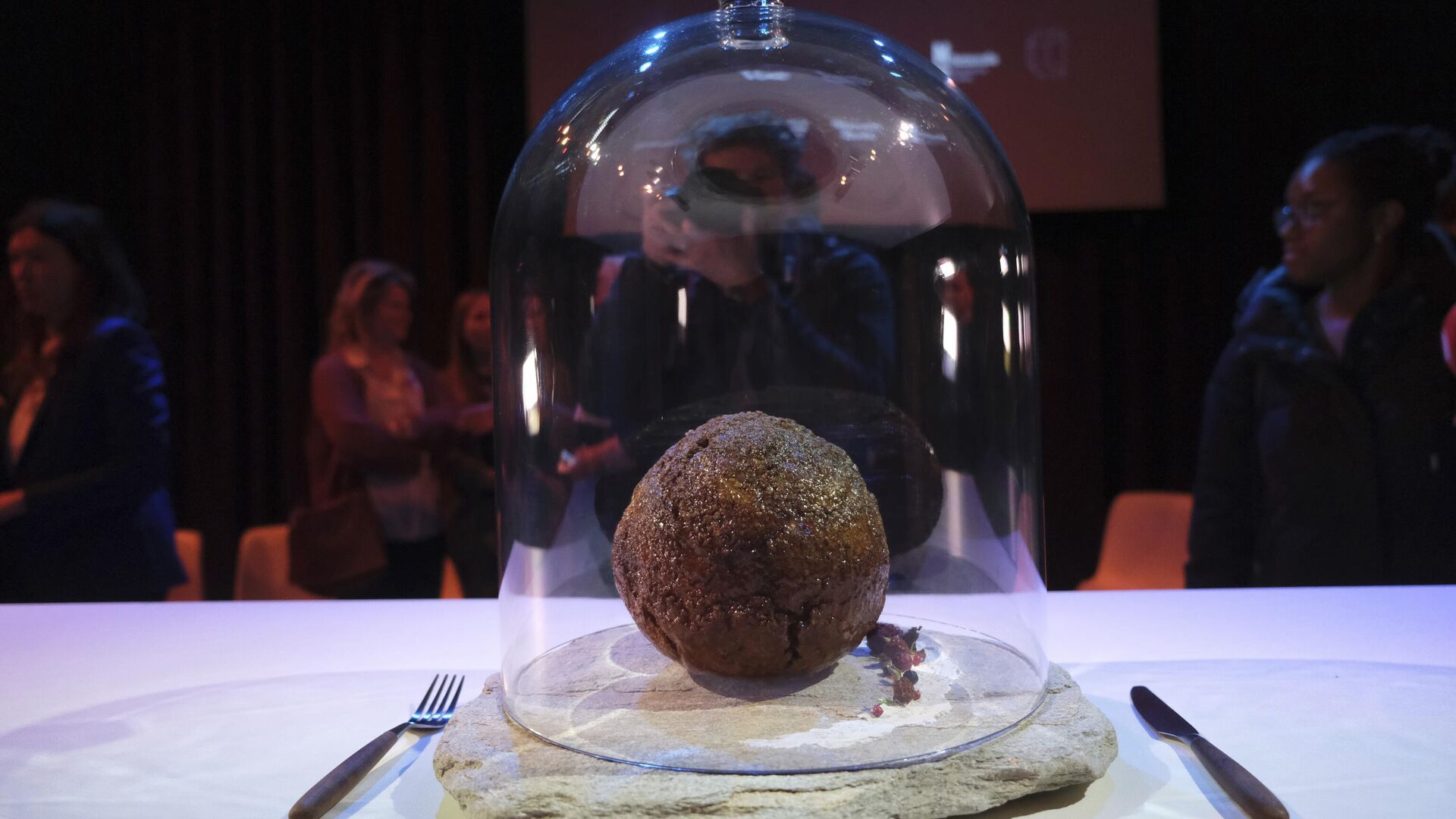https://sputnikglobe.com/20230329/australian-company-made-meatballs-with-wooly-mammoth-protein-1108939194.html
Australian Company Made Meatballs With Wooly Mammoth Protein
Australian Company Made Meatballs With Wooly Mammoth Protein
Sputnik International
Vow, an Australian biotech company that specializes in in vitro meat production, introduced meatballs with the protein of the woolly mammoth. The company believes that its activities will contribute to the conservation of nature's biodiversity.
2023-03-29T23:23+0000
2023-03-29T23:23+0000
2023-03-30T00:03+0000
science & tech
netherlands
mammoth
woolly mammoth
meat
extinction
https://cdn1.img.sputnikglobe.com/img/07e7/03/1d/1108939042_0:160:3073:1888_1920x0_80_0_0_34f526d38a8223551a3527a9d25127a9.jpg
Employees of the startup together with researchers from the University of Queensland took information from public genetic databases about the mammoth DNA sequence, which is responsible for the production of the muscle protein myoglobin, which is largely responsible for the taste of meat.The missing fragments were supplemented based on data on the genome of modern elephants, the resulting sequence was synthesized and introduced into sheep myoblasts, which were then multiplied (a total of 20 billion hybrid cells were obtained) and used to grow meat.A mammoth meatball was presented to the public at Nemo, a science museum in the Netherlands.The entire process took about two weeks. However, no one knows yet what mammoth meatballs taste like.Don't expect to be adding Mammoth meatballs to your spaghetti anytime soon, Vow says the project was a one-off. Still, the company plans to put it through rigorous tests, just like the company says it does for products it does plan to bring to market.According to the Vow staff, the main goal of their project is not to mass-produce food with proteins from extinct animals, but to draw attention to the cultivation of meat in the laboratory.As part of its research, Vow, unlike a number of other companies of a similar profile, prefers to cultivate meat of unconventional animal species, such as alpaca, buffalo, crocodile, kangaroo and peacocks.It is believed that unlike traditional animal breeding, this approach to meat production is more ethical, causes less damage to the climate and the environment and as Vow's developments demonstrate, allows the creation of meat from exotic species with specified characteristics.This year, the company is preparing to start supplying cultured Japanese quail meat to restaurants in Singapore, the only country that currently allows the sale of cultured meat.
netherlands
Sputnik International
feedback@sputniknews.com
+74956456601
MIA „Rossiya Segodnya“
2023
News
en_EN
Sputnik International
feedback@sputniknews.com
+74956456601
MIA „Rossiya Segodnya“
Sputnik International
feedback@sputniknews.com
+74956456601
MIA „Rossiya Segodnya“
mammoth protein meatballs, vow cultivated meat, woolly mammoth mammuthus primigenius, nemo museum netherlands meatball, tim noakesmith, george peppou, vow will supply singapore restaurants with quail meat
mammoth protein meatballs, vow cultivated meat, woolly mammoth mammuthus primigenius, nemo museum netherlands meatball, tim noakesmith, george peppou, vow will supply singapore restaurants with quail meat
Australian Company Made Meatballs With Wooly Mammoth Protein
23:23 GMT 29.03.2023 (Updated: 00:03 GMT 30.03.2023) Vow, an Australian biotech company that specializes in in vitro meat production, introduced meatballs with the protein of the woolly mammoth (Mammuthus primigenius). The company believes that its activities will contribute to the conservation of nature's biodiversity.
Employees of the startup together with researchers from the University of Queensland took information from public genetic databases about the mammoth DNA sequence, which is responsible for the production of the muscle protein myoglobin, which is largely responsible for the taste of meat.
The missing fragments were supplemented based on data on the genome of modern elephants, the resulting sequence was synthesized and introduced into sheep myoblasts, which were then multiplied (a total of 20 billion hybrid cells were obtained) and used to grow meat.
A mammoth meatball was presented to the public at Nemo, a science museum in the Netherlands.
The entire process took about two weeks. However, no one knows yet what mammoth meatballs taste like.
"We haven’t seen this protein for thousands of years," said Professor Ernst Wolvetang, who worked with Vow to make the meatball. "So we have no idea how our immune system would react when we eat it. But if we did it again, we could certainly do it in a way that would make it more palatable to regulatory bodies."
Don't expect to be adding Mammoth meatballs to your spaghetti anytime soon, Vow says the project was a one-off. Still, the company plans to put it through rigorous tests, just like the company says it does for products it does plan to bring to market.
According to the Vow staff, the main goal of their project is not to mass-produce food with proteins from extinct animals, but to draw attention to the cultivation of meat in the laboratory.
"We chose the woolly mammoth because it’s a symbol of diversity loss and a symbol of climate change," said Tim Noakesmith, Vow's cofounder.
As part of its research, Vow, unlike a number of other companies of a similar profile, prefers to cultivate meat of unconventional animal species, such as alpaca, buffalo, crocodile, kangaroo and peacocks.
"We have a behaviour change problem when it comes to meat consumption," said George Peppou, CEO of Vow. "The goal is to transition a few billion meat eaters away from eating [conventional] animal protein to eating things that can be produced in electrified systems. And we believe the best way to do that is to invent meat. We look for cells that are easy to grow, really tasty and nutritious, and then mix and match those cells to create really tasty meat."
It is believed that unlike traditional animal breeding, this approach to meat production is more ethical, causes less damage to the climate and the environment and as Vow's developments demonstrate, allows the creation of meat from exotic species with specified characteristics.
This year, the company is preparing to start supplying cultured Japanese quail meat to restaurants in Singapore, the only country that currently allows the sale of cultured meat.

